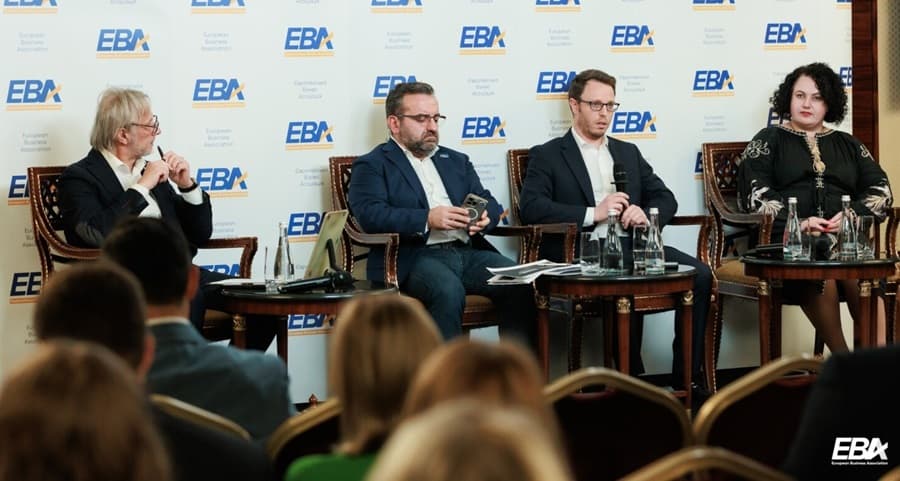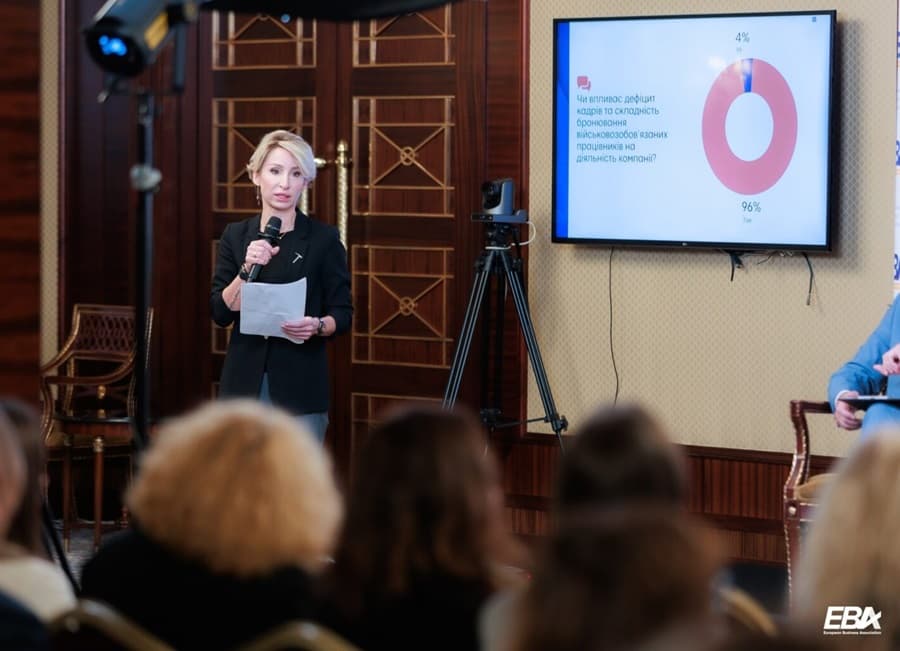In the first part of the event, the speakers discussed achievements and challenges in the subsoil use sector
The event was opened by Oleh Bondarenko, the Head of the VRU on Environmental Issues. He addressed several critical and time-sensitive issues, including the creation of easements, the recycling of mining waste, deforestation and most notably, the introduction at the legislative level of the “Strategic Minerals” concept, which has not been established in Ukraine yet. This introduction will bolster the country’s position in the global market and establish a resilient economic foundation. “We must implement changes to the mineral base in Ukraine”, – he stated.Roman Opimakh, the Head of the State Service of Geology and Mineral Resources of Ukraine, proceeded to elaborate on the subject and share the achievements of his service: “The Service has digitized all the key services, is preparing new subsoil use objects for electronic bidding, regularly announces and holds auctions and issues special permits for subsoil use.”
There is an online registration form for work and research related to the geological study of subsoil, as well as financial reporting forms in the mining industry.
Furthermore, over 500 special permits have been sold for approximately six billion hryvnias since the e-bidding commenced. Roman identifies the primary objective as transparency and accessibility of information, as well as the declassification of certain subsoil, given the difficulty in attracting investors with existing restrictions.
Dmytro Kashchuk, the Head of the EBA Subsoil Committee; Business Development Director of the Geological Investment Group, confirmed the tremendous work done by the State Service of Geology and Mineral Resources and the positive trends in the regulatory environment. He noted that it is necessary to improve and change the conditions and type of bidding for the sale of hydrocarbons.

The second part of the event was devoted to the “ESG in subsoil use”
Liudmyla Tsyganok, Founder of the ESG Liga in Ukraine, the President of the PAEW Association, and Olga Semkiv, Director of ESG Project at “ArcelorMittal Kryvyi Rih”, told the participants about the ESG components (Environmental Social Governance). According to Liudmyla, ESG is all about investment, balance and trust.Andrii Gorokhov, the CEO of UMGI, provided his understanding of the term ESG: “It’s not simply a checklist, but rather a philosophy that includes people, responsible people and people with an understanding of their mission for investors.”
Ms. Semkiv discussed the European Sustainability Reporting Standards (ESRS). ESG reporting and disclosure facilitate access to capital markets and licensing to operate for companies. An ESG report discloses environmental, social and governance data using specific criteria to provide investors with insight into the risk profile of an entity. In order to make effective and responsible investments, investors require ESG reports that provide dependable, accurate, comparable and timely data. In today’s market, investors and other stakeholders, including customers and employees, are searching for brands that demonstrate a robust ESG performance.
Mr. Artem Petrenko, Executive Director of the Association of Gas Producers of Ukraine, presented compelling arguments in favor of utilizing gas. Mr. Petrenko began his presentation with an overview of the current state of gas supply and demand in the EU. “In continental Europe, gas is not produced on the scale of consumption. However, the EU has demonstrated its ability to adapt to new challenges. Within a year of deciding to reduce gas purchases through the pipeline, the EU built terminals that can receive gas from Norway, Qatar, the United States and other countries.” Concurrently, the EU has reduced its gas consumption and is encouraging the production of biomethanol (from agricultural waste).
Mr. Petrenko provided arguments for the advantages of such a resource. “Gas is a tangible, reliable resource. Gas provides heat, energy and the ability to work,” he stated. The significance of gas is underscored by its multifunctional capabilities. In addition to traditional liquefied or pipeline gas, natural gas is available in a variety of forms, including methane, ethane, propane, butane and others. “Despite the differences in production or extraction technologies, synthesis gas, biomethane, coal bed methane, coke-oven gas, deepwater hydrant gas, pyrolysis gas, etc., all serve the same purpose: to be a reliable resource for consumers.” Each country selects the most profitable and efficient type of gas based on its location, capabilities, and needs.
“In a world where the demand for electricity has increased dramatically, Ukraine has a unique chance for multi-vector sectoral development. It has the potential to become a leader in carbon neutrality, aligning itself with EU directives and the energy transition strategy, while also capitalizing on its favorable geological conditions for project implementation.” – Artem said.
Sergii Voitsekhovskyi, Board Member at BGV Group Management, began the final part of the event by discussing financial incentives in subsoil use, their opportunities and challenges. Sergii explained to the participants that mining is not about 5-10 years, but decades. “It is important for an investor to know what will happen in 20 years,” he noted. The main message in his speech was full of optimism, as we are already on the way to large foreign financing. Potential investors started to notice Ukraine: “We are a subject, as we are both heard and seen”, – said Sergii.
Olena Gil, Deputy Team Leader of the “Financial Intermediation and Private Sector Facilitation Unit” of the USAID Project “Investment for Sustainable Business,” presented an overview of the B2B BNPL (or B2B factoring) program, eDilo. The objective of the program is to enhance the efficiency of factoring for Ukrainian MSMEs (micro, small, and medium-sized enterprises) by offsetting the cost of factoring to MSME sellers and offering cashback to MSME buyers. The program has already financed 20 enterprises for a total of UAH 15 million, with a target of UAH 390 million and 450 enterprises.

In conclusion, the Mining Day 2024 event highlighted the necessity of developing subsoil use in Ukraine in order to overcome the current challenges. The discussion addressed pivotal legislative elements of strategic minerals regulation, including the potential for third-party sales of subsoil use permits, which could enhance market transparency and attract investment. Draft Law No. 4187 provides for the reform of the subsoil use sector, particularly the simplification of the process for obtaining special permits for subsoil use. The proposal includes the removal of certain mandatory approvals from local administrations and other bodies, which will streamline the process for businesses seeking to engage in mining activities.
Another crucial legislative aspect is the digitalization of processes, which streamlines the submission of documents through electronic services. This not only simplifies the process of accessing geological information but also increases the efficiency of control over subsoil use.
Moreover, the meeting highlighted the importance of attracting international investors, the necessity of aligning with European standards, and the emergence of new challenges in the energy market.
The event served as a platform for identifying future industry directions, which will require coordinated efforts from the state, business, communities and international partners.
Experts of the “Natural Resources and Energy” industry group at BDO in Ukraine constantly monitor and analyze the current situation in the industry. Such analysis and experience guarantee high-quality services that meet the needs of our clients.
Please contact us for professional support and advice on audit, consulting and sustainability issues for your company!
